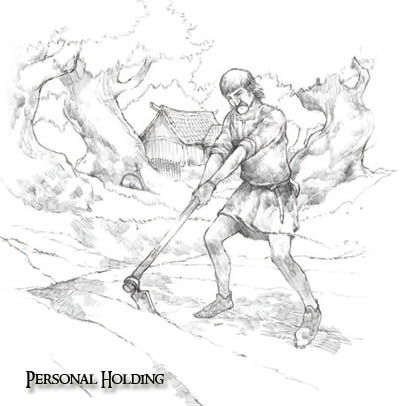 Rules for Holdings
Rules for HoldingsHe lives in an oakwood and has a great wooden house; and as a man he keeps cattle and horses...'
Over the course of the campaign, heroes may come into possession of a holding. A holding might be a business, like a smithy or a tavern. It might be a farm, or the companion might own land that is tilled by peasants who rent the land and give the character a portion of each harvest. Holdings do not need to be limited to strictly physical possessions a Woodman's home and family might together constitute a holding.
A holding represents the hero's main occupation when he is not adventuring. Bag End might be considered part of a holding belonging to Bilbo Baggins (and later, Frodo); Sam's gardening job there would also be a holding (of less value).
Not every adventurer has a holding; a truant Hobbit far from the Shire or a merry Elf might not have any responsibilities or commitments.
There are many ways for a hero to come into possession of a holding. For example, a lucky hero might inherit a holding from a wealthy family member. Typically, a companion gains a holding as the result of an adventure, perhaps as a gift, or perhaps by finding an unoccupied holding and taking possession of it.
Holdings Table:
| Rating | Description | Minimum Score | Example |
| 9 | Modest | 1 | Trapper's Cabin |
| 8 | Adequate | 2 | Farm, cottage |
| 7 | Respectable | 3 | Small inn, mansion |
| 6 | Superior | 4 | Rich hunting ground, large inn |
| 5 | Thriving | 5 | Iron mine |
| 4 | Opulent | 6 | Gold min, large estate |
The value of a holding is measured in gaming terms by a numerical rating, ranging from 4 to 9. This value is comparable to the Target Number for an action, in the sense that a low number is preferable to a high number (see below). A poor farm on a rocky hillside might have a rating of 9; a rich farm in the fertile Anduin valley might have a rating of 6.
Minimum Score
Heroes cannot own a holding unless they possess a minimum score in an appropriate characteristic. The rating of a holding is limited by a character's Standing if it is found within the borders of a hero's homeland, while it is limited by a hero's Valour score if it is located anywhere else (owning property beyond one's station is seen as unusual and rather suspect almost anywhere).
Specialities
A character who owns a holding may profit from having a matching Speciality an innkeeper should learn Cooking, a Hunter Beast-Lore and so on (see the Tend to Holding Fellowship phase undertaking, below).
Running a Holding
The mundane affairs of running a business planting crops, mining ore, forging tools and so on can be ignored in the game; it is assumed that the character has the requisite skills, or can employ someone who does. What is important to determine is how a holding may change over the course of the years, and what fruits does it bear.
Holdings Upkeep
In the course of the last Fellowship phase of each year (Year's End) all players whose heroes have a holding must make a roll using the Feat die.
- If the roll result is equal to or less than the holding's rating, then the holding produces just enough wealth to keep the character at his Standard of Living.
If the Loremaster deems it appropriate to the current circumstances, a result of 1 or 2 may be interpreted to mean that the character's holding does not produce enough to cover his living expenses, forcing the hero to spend stored Treasure to maintain his Standard of Living.
- If the result is greater than the rating, then the character does not only attain his appropriate Standard of Living but, if the holding is a property capable of producing wealth (such as an inn, or tracts of land), it earns Treasure equal to the difference between the roll and the rating.
For example, if a player rolls a 9 on a holding rated 6, he earns three Treasure that year.
- If the result is Gandalf Rune, then good fortune strikes the hero! He gains no extra Treasure, but prospers in some other way a sick child recovers, an old feud is settled, the weather is unusually pleasant. The rating for the holding is permanently lowered by 1 (to a minimum of 3).
- If the result is Sauron Rune, then the holding suffers some disaster or misfortune. If the hero does not take action in the next Fellowship phase, the holding may be destroyed or have its rating increased.
For example, a farm might be damaged by flooding or bad weather; an inn might be attacked by raiders, a gold mine might be taken over from below by Goblins.
New Fellowship Phase Undertaking: Tend to Holding
A character may spend a Year's End Fellowship phase tending to his holding by choosing this undertaking. If he does so, he may roll the Feat die twice and choose the best result when determining the conditions of his property. If the hero possesses an appropriate Speciality, he additionally gains an Advancement point.
